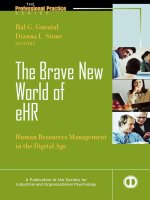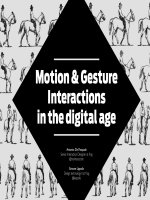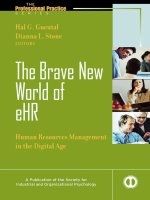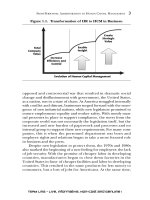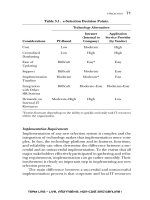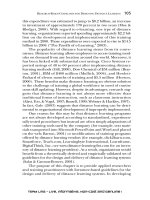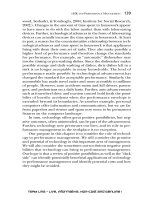Teaching in the digital age using facebook group for extracurricular activities on learning vocabulary
Bạn đang xem bản rút gọn của tài liệu. Xem và tải ngay bản đầy đủ của tài liệu tại đây (2.16 MB, 175 trang )
MINISTRY OF EDUCATION AND TRAINING
HO CHI MINH CITY UNIVERSITY OF TECHNOLOGY
---------------
HA THI PHUONG THAO
TEACHING IN THE DIGITAL AGE: USING
FACEBOOK GROUP FOR EXTRACURRICULAR ACTIVITIES ON LEARNING
VOCABULARY
Major: English Language
Course code: 60220201
HO CHI MINH CITY, DECEMBER 2020
MINISTRY OF EDUCATION AND TRAINING
HO CHI MINH CITY UNIVERSITY OF TECHNOLOGY
---------------
TEACHING IN THE DIGITAL AGE: USING
FACEBOOK GROUP FOR EXTRACURRICULAR ACTIVITIES ON LEARNING
VOCABULARY
Submitted to
the Faculty of English Language
in partial fulfillment of the Master‟ degree in English Language
Course code: 60220201
By
HA THI PHUONG THAO
Supervised by
NGUYEN VU PHUONG, PhD
HO CHI MINH CITY, DECEMBER 2020
The thesis entitled TEACHING IN THE DIGITAL AGE: USING FACEBOOK
GROUP FOR EXTRA-CURRICULAR ACTIVITIES ON LEARNING
VOCABULARY was successfully defended and approved on December 23rd, 2020
at Hochiminh City University of Technology (HUTECH).
Academic supervisor : Nguyen Vu Phuong, Ph.D
Examination Committee
1. Nguyen Thi Kieu Thu, Ph.D
Chair
2. Truong Cong Bang, Ph.D
Reader 1
3. Dương My Tham, Ph.D
Reader 2
4. Nguyen Thi Nhu Ngoc, Ph.D
Member
5. Le Van Tuyen, Ph.D
Secretary Member
On behalf of the Examination Committee
Chair
i
HCMC UNIVERSITY OF TECHNOLOGY
POST GRADUATE INSTITUTE
HCMC, DECEMBER 2020
MASTER’S THESIS REPORT
Student‟s name: HA THI PHUONG THAO
Sex: Female
Date of birth: 01/11/1982
Place of birth: Ho Chi Minh City
Major: English Language
Student code: 1641900074
I. Thesis title:
“Teaching in the Digital Age: Using Facebook Group for Extra-Curricular
Activities on Learning Vocabulary”
II. Objectives and contents:
The objective of the present study is to gain a description of how activities
on Facebook group (namely information-sharing via Facebook platform as an extracurricular activity) help to promote the vocabulary learning of the first-year English
majored students and to investigate students‟ perceptions of using activities on
Facebook group for such application in the educational context of University of
Phan Thiet (UPT).
The qualitative research was employed with 7 volunteer participants from
UPT in the academic year of 2019-2020. The five authentic topics were selected to
post on the Facebook group for students‟ discussions and comments known as
information-sharing session; simultaneous, the participating students were requested
to record their feeling to activities for vocabulary learning on Facebook group.
Finally, the semi-structured interviews were conducted with seven target students.
The students‟ written discussions on Facebook group were documented for content
analysis to examine whether using this platform can promote students‟ vocabulary
learning. Whilst, the students‟ dairies were collected at the end of the course to
document the students‟ thoughts and perceptions of utilizing Facebook group to
enhance their vocabulary knowledge. Also, the thematic analysis was used to
ii
analyze the students learning diaries and interview transcribes in order to categorize
the dominant perceptions from the student participants of the use of Facebook group
for vocabulary acquisition.
Generally, the results of the study indicated that the application of
community of practice via Facebook group improved the students‟ participation,
which led to the fact that students had more opportunities to apply the words
presented in the classrooms by their teachers. Furthermore, being involved in the
exchanges, the students were required to review their peers‟ messages, so they
needed to effectively understand them. They not only talked about the topics but
also shared their hobbies and feelings, which all-together was very helpful to
increase students‟ collaboration, confidence and to build students‟ autonomy.
Besides, through their learning diaries and transcribes of face-to-face interview,
themes analysis revealed that the students all held positive perceptions towards
employing Facebook group for vocabulary development. However, some concerns
about such an application were also expressed by the students. The findings of the
study suggested that activities outside the classrooms were of paramount
importance to help students with their vocabulary enhancement; hence, teachers,
curriculum designers might take the matter into account. Also, fluency should be
encouraged rather than accuracy to stimulate the participation level of the students.
Finally, it was recommended that further studies should be conducted with bigger
size of samples and longer duration for tasks assigned.
III. Starting date: 8th May 2018
IV. Completing date: 23rd Oct 2020
V. Academic Supervisor: NGUYEN VU PHUONG, Ph.D.
ACADEMIC SUPERVISOR
FACULTY DEAN
Dr. NGUYEN VU PHUONG
Dr. NGUYEN THI KIEU THU
iii
CERTIFICATE OF ORIGINALITY
I certify my authorship of the Master‟s Thesis submitted today entitled:
TEACHING IN THE DIGITAL AGE: USING FACEBOOK GROUP FOR
EXTRA-CURRICULAR ACTIVITIES ON LEARNING VOCABULARY
In terms of the statement of requirements for Theses in Master‟s programs issued by
the Higher Degree Committee of Faculty of English Linguistics, Ho Chi Minh City
University of Technology.
Ho Chi Minh City, December 2020
Ha Thi Phuong Thao
i
RETENTION AND USE OF THE THESIS
I hereby state that I, HA THI PHUONG THAO, being a candidate for the
degree of Master of Arts (English language) accept the requirements of Ho Chi
Minh University Of Technology (HUTECH) relating to the retention and use of
Master‟s Theses deposited in the Library.
In terms of these conditions, I agree that the original of my Master‟s Thesis
deposited in the Library should be accessible for purposes of study and research, in
accordance with the normal conditions established by the Librarian for the care,
loan and reproduction for theses.
Hochiminh City, December 2020
Signature
HA THI PHUONG THAO
ii
ACKNOWLEDGEMENTS
I would like to express my deep gratitude and respect to a number of people
who gave support, encouragement, suggestion and comments.
First, I would like to acknowledge the guidance and support given by my
supervisor, Dr. Nguyễn Vũ Phương during the months I have been involved in this
study. I am so thankful for his willingness to help me whenever I need some
clarification. His useful discussion and comment widen my knowledge in various
fields of the study which helps me to make my thesis as much convincing as
possible.
In addition, I acknowledge the great contribution of the administrators and
students at University of Phan Thiet where the research was conducted. My thesis
would have never been possible without their support and data that played an
extremely important role in this study.
Then, I would like to express my sincere thanks to my teachers and
classmates at Ho Chi Minh University of Technology for their support, lectures and
instructions for my learning process.
Finally, I would like to send my special thanks to my family for their support
and patience during the research. They always give me encouragement and
unconditional love, caring when I had difficulties and distraction on my thesis.
Without that, I could not go to this end.
iii
ABSTRACT
Today, English is considered as a global language that affects almost every
aspect of life. Therefore, it is one of the compulsory subjects in Vietnam‟s
education system. Good English communication skills are indispensable for
students' success in learning, study and future works. It is believed that limitation in
vocabulary knowledge has prevented students from gaining confidence and fluency
in English communication skills. Therefore, the current study intended to
investigate the potential of incorporating community of practice via Facebook
closed-group for students‟ vocabulary acquisition. The study explored how
activities on Facebook closed group as an extra-curricular activity could help to
improve the vocabulary learning of ELT students. Also, the student participants‟
perceptions of using Facebook closed-group for vocabulary learning were explored.
Multiple data collection methods were used in the qualitative case study. This
qualitative study was conducted with 7 first-year-students of the Faculty of Foreign
Languages, University of Phan Thiet, in the academic year 2019-2020. The study
results indicated that the incorporation of community of practice via Facebook
group improved the students‟ participation that enhanced the utilization of more
words to discuss, express themselves confidently and fluently to others. Besides,
through their learning diaries and semi-structured interviews, the findings from
themes analysis revealed that the students all held positive perceptions towards
employing Facebook group for vocabulary development. In conclusion, the results
of the study indicated that community of practice via Facebook group could be
viewed as a promising learning environment for English education and vocabulary
development for students at university level.
Keywords: Digital Age, Facebook Group, Vocabulary, Extra-Curricular activities,
learning languages
iv
TABLE OF CONTENTS
CERTIFICATE OF ORIGINALITY .................................................................... I
RETENTION AND USE OF THE THESIS ......................................................... II
ACKNOWLEDGEMENTS ................................................................................. III
ABSTRACT .......................................................................................................... IV
TABLE OF CONTENTS ....................................................................................... V
LIST OF TABLES ................................................................................................. X
LIST OF FIGURES ............................................................................................. XI
LIST OF ABBREVIATIONS .............................................................................. Xii
CHAPTER 1: INTRODUCTION .......................................................................... 1
1.1 Background to the study.................................................................................. 1
1.2 Statement of the problem ................................................................................ 3
1.3 Aims of the study ............................................................................................ 6
1.4 Research questions .......................................................................................... 6
1.5 Significance of the study ................................................................................. 6
1.6 Scope of the study ........................................................................................... 7
1.7 Definitions of key terms .................................................................................. 7
1.8 The organization of the study .......................................................................... 9
CHAPTER 2: LITERATURE REVIEW ............................................................ 11
2.1 Introduction ................................................................................................... 11
2.2 Teaching and Learning Vocabulary .............................................................. 11
2.2.1 The definition of Vocabulary................................................................... 11
2.2.2 Classification of vocabulary .................................................................... 12
2.2.3 The importance of vocabulary teaching in learning English .................... 15
v
2.2.4 Principles of learning and teaching vocabulary ....................................... 17
2.2.5 Strategies of learning and teaching vocabulary ....................................... 18
2.2.6 Sources of Vocabulary............................................................................. 20
2.3 Communities of Practice ............................................................................... 21
2.3.1 Descriptions ............................................................................................. 21
2.3.2 Application of virtual community of practice in Education ..................... 23
2.4 Education in a Digital Age ............................................................................ 25
2.5 Social networks in EFL learning and teaching process ................................. 26
2.6 Facebook and Facebook group ...................................................................... 30
2.6.1 Definitions ............................................................................................... 30
.
2.6.1.1 Facebook …………………………………………………………30
2.6.1.2 Facebook group in EFL setting ……………………………........ 32
2.6.2 Facebook for social and educational communication .............................. 33
2.6.3 Facebook for Extra-Curricular Activities ................................................ 35
2.6.4 Facebook features for building online community of practice ................. 35
2.6.5 Facebook for enhancing vocabulary learning .......................................... 36
2.6.6 Discussion and information sharing on Facebook ................................... 37
2.7 Previous studies ............................................................................................ 39
2.8 Conceptual Framework ................................................................................. 44
2.9 Summary ....................................................................................................... 46
CHAPTER 3: METHODOLOGY ....................................................................... 47
3.1 Introduction ................................................................................................... 47
vi
3.2 Research site ................................................................................................. 47
3.3 Research design............................................................................................. 52
3.4 Sample and sampling procedures .................................................................. 53
3.5 Research Instruments .................................................................................... 54
3.5.1 Learners‟ interaction via Facebook group ............................................... 55
3.5.2 Diary learning activities........................................................................... 56
3.5.3 Semi structured Interview ........................................................................ 58
3.6 Data collection procedures ............................................................................ 59
3.7 Data analysis procedures ............................................................................... 61
3.7.1 Analysis of students‟ interactions on Facebook group ............................. 61
3.7.2 Analysis of students‟ diary ...................................................................... 63
3.7.3 Analysis of semi-structured interview ..................................................... 64
3.8 Validity and reliability .................................................................................. 65
3.9 Ethics ............................................................................................................ 66
3.10 Summary ..................................................................................................... 66
CHAPTER 4: RESULTS AND DISCUSSION ................................................... 68
4.1 Introduction ................................................................................................... 68
4.2 Results........................................................................................................... 68
4.2.1 The first research question ..................................................................... 68
4.2.1.1 Improving students‟ vocabulary ...................................................... 69
4.2.1.2 Enhanced collaborations .................................................................. 73
4.2.1.3 Improving students‟ confidence ....................................................... 75
vii
4.2.1.4 Building student‟s autonomy ........................................................... 78
4.2.2 The second research question ................................................................ 80
4.2.2.1 Helpful learning environment .......................................................... 81
4.2.2.2 Relaxing learning environment ........................................................ 82
4.2.2.3 Motivating learning environment..................................................... 84
4.2.2.4 Challenges ....................................................................................... 87
4.3 Discussion ..................................................................................................... 88
4.3.1 The effectiveness of learning activities outside the classroom through
community of practice on Facebook closed group for students' vocabulary
learning…………………………………………………………………………… 88
4.3.2 Students' perceptions of application of Facebook group as a learning
community to improve their vocabulary knowledge………………………….. … 91
4.4 Summary ....................................................................................................... 94
CHAPTER 5: CONCLUSION AND RECOMMENDATIONS ........................ 96
5.1 Summary of the main findings of the thesis .................................................. 96
5.2 Pedagogical implications ............................................................................... 97
5.3 Limitations .................................................................................................... 98
5.4 Recommendations for further study .............................................................. 98
REFERENCES ................................................................................................ 100
viii
APPENDICES
APPENDIX 4A: Learning activities on Facebook group ..................................... 116
APPENDIX 4B: Students‟ dairies to activities on Facebook group …………..128
APPENDIX 4C: Analysis of students‟ responses to semi-structured questions ... 145
APPENDIX 4D: Students‟ interview transcriptions ............................................. 151
ix
LIST OF TABLES
Table 2.1: “What is involved in knowing a word?”
14
Table 3.1: Vocabulary teaching and learning procedures in and outside
the „Speaking 1‟ class
Table 3.2: Research instruments applied for each research question
50
Table 3.3: The research data collection procedures
60
Table 4.1: Participants‟ participation in the information-sharing task via
69
x
55
LIST OF FIGURES
Figure 2A: Community of practice
23
Figure 2B: Conceptual Framework of Teaching in the Digital Age:
46
Using Facebook groups for extra-curricular activities on learning
vocabulary
xi
LIST OF ABBREVIATIONS
UPT: University of Phan Thiet
EB: English for Business
EFL: English as a foreign language
FFL: Faculty of Foreign Languages
xii
CHAPTER 1
INTRODUCTION
This chapter mentions the background to the study, problem statement,
purpose of the study, thesis statement, literature review, scope of the study and
significance of the study.
1.1 Background to the Study
Nowadays, English has become a global language that affects almost every
aspect of our lives. Hence, in most universities in Vietnam, English is one of the
compulsory subjects. Students are taught four English skills included listening,
speaking, reading, and writing. And one of the skills that students always lack
confidence in is speaking skill. And this situation is not exception for the EFL
students in Faculty of Foreign Languages at Universities in Viet Nam. The
explanation for this problem is that when studying English in primary schools,
secondary schools, high schools, students just focused on grammar and reading to
get high scores in their tests and to pass the national exams. Pronunciation, speaking
and listening as well as vocabulary education seemed to be ignored and neglected.
On the other hand, acquiring excellent communication skills bring many benefits to
students not only in the academic environment but also in their future careers.
Additionally, in order to communicate well in a foreign language, students should
acquire an adequate number of words and should know how to use them accurately
(Nguyen, Khuat, 2012). Thus, with a view to encouraging students‟ participation in
speaking activities, English teachers should focus on empowering students and
guiding them to meaningful communicative situations and environments rather than
force them to memorize structures and rules. In other words, in spoken language,
the words used must be very familiar and used in daily communication on the
purpose of understanding the spoken conversation. Therefore, to be proficient in
using words in verbal communication, the students not only need to remember their
Page 1
meaning, spelling, and pronunciation, but also have opportunities to encounter the
words in different contexts.
Besides, the speedy advancement of technology has shaped new educational
practices; especially in the field of English language teaching (ELT). Rana (2013),
for instance, strongly recommended that educational institutions around the world
are expected to employ technology in education to equip students with digital skills
which are considered to be significantly beneficial to students‟ English language
acquisition. Also, Pun (2013) highlights that it seems impossible to stop the
evolution of technology; yet, the author suggests that English educators need to
work out a suitable way to integrate technology in the training programs and make
use of that, instead of working in a way that separates them. In other words, it can
be seen that the development of the technology has directly affected learning and
teaching model in the field of ELT.
Particularly, social networking sites including Facebook are among samples
of the technology evolution. As mentioned to the aspect, one thing requiring
significant attention from educational stakeholders is the most common social
network at the present time – Facebook which is considered as the most updated
and useful multimedia channel to support the extra activities in English as a foreign
language (EFL) classes for the teachers. Wong, Kwan, and Leung (2011) stated that
not only were students at all levels but also teachers became deeply involved in
Facebook on the daily basis. The researchers also demonstrated that more and more
English language educators are now incorporating Facebook to promote students‟
information sharing, interaction and collaboration in the target language. For
instance, Samuels (2013) revealed that development included in social media is
adopting foreign language education in new direction. Similarly, Facebook has been
recognized as a promising virtual learning setting among English language learners
since appropriate application of Facebook may encourage students‟ involvement in
both in-class and out-of-class learning activities (Gachago & Ivala, 2012; Kabilan,
Page 2
2016). Further, Patahuddin & Logan (2015) suggested that a closed group on
Facebook might serve as an informal learning environment among the participants.
Even though the initial objectives of Facebook aimed at offering a virtual
communication setting for social interaction, it can also facilitate online
communities for students to coordinate together and in order to foster collaborative
learning. In other words, the utilization of Facebook for English language
acquisition can be considered to be a promising tool to be explored due to its
popularity and accessibility to the enormous population from different corners of
the world.
A community of practice is regarded as a group of people who share their
knowledge, ideas and practices in a common domain or topic (Wong, et al., 2011).
Moreover, the writers also highlighted that the concept of community of practice
which has gained great ground at tertiary level in recent years emphasized on
communication, idea sharing on common problems and issues; especially, closed
group learning as a team. Additionally, online communication and information
sharing are identified as the key characteristic of Facebook; hence, Facebook can be
considered as an ideal platform to apply community of practice in virtual learning
setting. Sharing the same point of view, this paper is going to analyze one aspect of
Facebook used as a virtual environment as a community of practice for students to
recall and practice known vocabulary and their perceptions of such application in
their learning process. The finding of the thesis is expected to provide a new
learning experience for both language educators and students at tertiary level in the
context EFL like Vietnam.
1.2 Statement of the problem
In Vietnamese teaching context, although there have been several changes in
English language education, the outcome is far from impressive (Phuong Hoang
Yen, 2015). Particularly, at tertiary level graduates have not met the requirements of
educational stakeholders and the objectives of the English programs in terms of
English proficiency level (Dang Tan Tin, 2012); also, Phuong Hoang Yen (2015)
Page 3
emphasizes that their English ability is considered lower than their counterparts in
the Asian region. Specifically, it is reported that most students in Vietnam lack
confidence in speaking skills, and one of the reasons leading them to this problem is
they do not have enough vocabulary to express their thoughts as well as
opportunities to practice their learned words in real conversations. This point of
view is similar to Mumary‟s (2017), which demonstrates that one of the major
obstacles that students encounter that English educators have been concerned about
for ages is that students do not have sufficient vocabulary knowledge. Therefore,
the need to promote vocabulary acquisition needs to be more capitalized in
encouraging the confidence of students‟ speaking skill.
In reality, there have been several empirical studies illustrating that
vocabulary learning process should be expanded outside the four walls of the
classrooms which suggests that extra-curricular activities be included to help
students improve their vocabulary (Guo, 2011). In other words, purposeful out-ofclass activities may function as means of promoting the students‟ vocabulary
acquisition. Moreover, the taxonomies of vocabulary learning strategies were
summarized by Istvan (2016) who emphasized on the importance of word practice
in various situations as the indispensable element included a single strategy. In
brief, in order to enhance vocabulary learning among English learners, providing
students with opportunity, setting to use words in sentences and repeating words in
writing can be of paramount importance; and the out-of-class activities also play a
crucial aspect in vocabulary development.
Prensky (2001) highlights that most of the students are “digital natives” who
are very comfortable with technology long before they enroll in university level
courses. Students at tertiary level have made great strides in applying various forms
of technology in their social and academic lives. Especially, Barczyk and Duncan
(2013) find that Facebook and other forms of social networking media are gradually
and steadily transforming education and the way most subjects are taught. In
Vietnamese setting, it is reported that Vietnam has around 64 million Facebook
Page 4
users, accounting for 3 percent of global Facebookers, according to a July report
released by We Are Social, a social media marketing and advertising agency.
Besides, it is observed that students at tertiary level own at least one Facebook
account and 92 percent of them use Facebook regularly. It can be said that
Facebook is most frequently used by Vietnamese students on their daily basis.
Additionally, Facebook seems to be a supplementary learning environment and
function as a community of practice for vocabulary learning procedures (Kabilan &
Zahar, 2016) outside the classroom since it generates informal learning context
where students can freely interact each other, share their understanding, and practice
their own vocabulary knowledge.
Recently, some studies have investigated the utilization of Facebook in
English language acquisition by Vienamese researchers. For instance, Tran Phuong
(2016) stated that Facebook effectively functioned as reminding and motivating
components from the perspectives of students. Also, the finding from Vu Doan Thi
Huong Thao‟s (2019) investigation revealed that Facebook could be an effective
learning platform for culture courses in English language. Still, rare studies were
interested precisely in the role of Facebook (Hew, 2011); particularly its function as
a community of practice outside the classroom constraint for vocabulary
development.
Being inspired by the popularity of Facebook among students at tertiary level
and deficient vocabulary when communicating in English language, the thesis
author comes to decision of applying community of practice via Facebook closedgroup for the first-year English majors with the aim of encouraging them to
participate in vocabulary learning activities outside the classroom, and then turn to
improve the vocabulary knowledge of the participant students. Also, the study aims
to investigate the student participants‟ perceptions of applying community of
practice via Facebook platform for vocabulary learning since Dang Tan Tin (2012,
p. 28) states that “Failing to take into account students‟ perceptions in designing
Page 5
classroom activities may result in unexpected outcomes”. Hence, students‟
perceptions are taken into account in the current investigation.
1.3 Aims of the study
The main aim of the study is, firstly, to help first-year English majored
students at University of Phan Thiet (UPT) improve their vocabulary knowledge by
using Facebook group as community of practice in extra-curricular activities.
Secondly, students‟ perceptions of the use of community of practice via Facebook
closed-group in improving their vocabulary development are also explored. To gain
the aims, the researcher has to reach the following objectives:
- To gain a description of how learning activities on Facebook group as a
community of practice help students improve their vocabulary learning.
- To explore the perceptions of the students toward the use of Facebook
group as a learning community outside of the classroom for improving their
vocabulary learning.
1.4 Research questions
In order to accomplish the above objectives, this study attempted to answer
the following questions:
(1) How do extra-curricular activities on community of practice via Facebook
closed-group help the first-year English majored students at University of
Phan Thiet (UPT) improve their vocabulary learning?
(2) What are the students‟ perceptions of the use of community of practice via
Facebook closed-group for improving their vocabulary learning?
1.5 Significance of the Study
The significance of the study is as follows:
On a theoretical level, the study is expected to contribute to the current
literature on the application of community of practice via Facebook closed-group
for the students‟ vocabulary acquisition. Particularly, students became more
Page 6
involved in communicating each other on virtual Facebook setting which could be
considered the practical environment for them to apply the words which they had
been taught in their classes. Also, they had more opportunities to encounter with the
words and established a long memory of the words.
On a practical level, the study may produce some recommendations to
prepare supplementary activities outside the classroom via the incorporation of
community of practice via Facebook closed-group to help students maintain their
vocabulary learning process. Especially, appealing topics might elicit more
exchanges and postings from the students so teachers should invest time to better
understand their students‟ needs and interests to easily attract their attention as well
as their cooperation and participation in the teaching and learning activities.
1.6 Scope of the study
In conjunction with the purpose, the study is limited to the sample of 07 firstyear English majored students in „Speaking 1‟ class coded K11NNA1 at UPT in
Binh Thuan province. The study focused on the utilization of community of practice
via Facebook closed-group as extra-curriculum learning activities outside the
classrooms to help the participating students with their vocabulary development. In
other words, other aspects of English language like grammar or structures were not
taken into consideration in the study. Besides, the current investigation restricts
itself to Facebook platform merely. The other social networking sites were excluded
in the study. Furthermore, the samples voluntarily participated in the study and the
findings from the analysis were based on their comments, feedbacks and opinions;
hence, the potential for generalization for all universities at higher education may
require further studies with bigger sample sizes and longitudinal research.
1.7 Definitions of key terms
In this research, there are four terms that require explanation for the sake
of clarity and convenience for the reader, which are “Teaching in the Digital Age”,
“Facebook Group”, “Extra-Curricular activities”, and “Community of Practice”.
Page 7
Firstly, “Teaching in the digital age” is used to imply that educators should
take advantage of the rapid development of information technology these days,
which provides the convenience for everyone to exchange information freely and
quickly, in teaching English. In the current study, the term refers to the use of
Facebook group to improve vocabulary learning for the first year English majored
students by the author, who is also an English teacher teaching the subject
"Speaking 1" at University of Phan Thiet.
Next, a “Facebook closed-group” can be viewed as a virtual community
which allows people to connect and interact with each other on a particular subject
or to just hang out together online (Murray and Weller, 2007, p.57). Further,
according to Yunus & Salehi (2012), „Facebook group‟ is also a place for users to
save their profiles, to upload and share photos, music and various types of message
they would like to share with other people. In the current study, the term refers to a
group of seven participant students who use Facebook group as an online
community of practice outside the classroom, where they could improve their
vocabulary learning by learning new vocabulary, interacting and discussing specific
topics posted by their English teacher.
Thirdly, “Extracurricular activities” are considered as activities that students
participate in outside the regular training curriculum. Lunenburg (2010, p.2) states
in his academic paper that “extracurricular activities serve the same goals and
functions as compulsory and elective courses in the curriculum”. However, they
provide experience that is not included in formal courses. They allow students to
apply the knowledge they have learned in classes and acquire the concepts of
democratic life. In the current study, the term refers to the students‟ discussions and
interactions on certain topics via Facebook closed group could help them to learn
new words, recall and practice the words they have learnt before in real
conversations.
Lastly, community of practice is a group of people who share a common
interest and a desire to learn from and contribute to the community with their
Page 8


